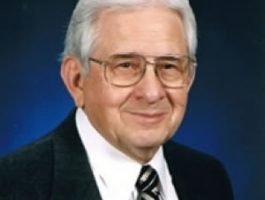
Ducks on the Pond: Rescued at Last
On July 30, 1945, the USS Indianapolis, with a crew of 900, was sunk by a Japanese torpedo. Five days later, 317 men were rescued. Hear about this riveting moment in history from survivor, Ed Harrell, today on the broadcast.
Show Notes
About the Host
About the Guest
-
On July 30, 1945, the USS Indianapolis, with a crew of 900, was sunk by a Japanese torpedo. Five days later, 317 men were rescued. Hear about this riveting moment in history from survivor, Ed Harrell, today on the broadcast.
-
Dave and Ann Wilson
Dave and Ann Wilson are hosts of FamilyLife Today®, FamilyLife’s nationally-syndicated radio program. Dave and Ann have been married for more than 38 years and have spent the last 33 teaching and mentoring couples and parents across the country. They have been featured speakers at FamilyLife’s Weekend to Remember® marriage getaway since 1993 and have also hosted their own marriage conferences across the country. Cofounders of Kensington Church—a national, multicampus church that hosts more than 14,000 visitors every weekend—the Wilsons are the creative force behind DVD teaching series Rock Your Marriage and The Survival Guide To Parenting, as well as authors of the recently released book Vertical Marriage (Zondervan, 2019). Dave is a graduate of the International School of Theology, where he received a Master of Divinity degree. A Ball State University Hall of Fame quarterback, Dave served the Detroit Lions as chaplain for 33 years. Ann attended the University of Kentucky. She has been active alongside Dave in ministry as a speaker, writer, small-group leader, and mentor to countless wives of professional athletes. The Wilsons live in the Detroit area. They have three grown sons, CJ, Austin, and Cody, three daughters-in-law, and a growing number of grandchildren.
-

Ed Harrell
Edgar Harrell owned and operated the Pella Window Company, Inc., Rock Island, Illinois for thirty-five years until his retirement in 1985. During the years 1970 to 1985, he served on the board of trustees of the Moody Bible Institute, in Chicago, Illinois, and has been a popular Bible teacher and lay minister throughout his adult life. He has enjoyed many years of fishing and big game hunting in the Rocky Mountains from Alaska to New Mexico, and currently resides in Clarksville, Tennessee with h...more
On July 30, 1945, the USS Indianapolis, with a crew of 900, was sunk by a Japanese torpedo.
Bob: Sixty five years ago this month, marine Ed Harrell and a number of other survivors of the attack on the USS Indianapolis were pulled from the Pacific. They had stayed alive for four-and-a-half days. Four-and-a-half days that, as you might imagine, Ed Harrell has never been able to forget.
Ed: I have not had nightmares. I've had many times that I've awakened and have a vivid scene of the happenings, and yet I think my counteraction to that is "Thank you, Lord, for sparing my life and for bringing me through all of this."
Bob: This is FamilyLife Today for Friday July 9th. Our host is the President of FamilyLife, Dennis Rainey, and I'm Bob Lepine. We'll hear today how God spared Ed Harrell's life, and we'll hear a remarkable story about a rescue in the middle of the Pacific.
Ed: You have to just say thank you Lord, I know you’re speaking to my heart. And, that somehow, some way you’re going to see me through.
Bob: And welcome to FamilyLife Today, thanks for joining us. You know, Hollywood has told some tales of castaways left on a desert island, folks surviving in the middle of nowhere, and I've seen some of those movies, and you watch them, and they're interesting. They have never come close to telling the story that we've heard this week.
Dennis: No, I agree, Bob. Ed Harrell has been with us all this week and has told a story, a compelling story of how God enabled him to survive an ordeal at sea after being a crew member on the USS Indianapolis, which was sunk on the night of July 30, 1945, by a Japanese submarine.
Ed, I want to thank you again for your service as a veteran, but also for writing this book and for taking us there and giving us a greater appreciation not just for veterans and what they've done to protect our freedom as Americans but also for taking us there and showing us what tough-minded faith in Almighty God looks like.
Because time and time again you've taken us to vivid scenes where you've been at a fork in the road where you've had to trust God, and you'd been at sea for four days in a life jacket. You'd only had a few tablespoons of water. You had some rotten potatoes that had come after you'd prayed for some food. You were on a raft, but you’d been separated from your buddies, and on the fourth day you are virtually alone.
Ed: No question. Even with my buddy at the time and, in fact, there were three of us at the tail end there that fourth day and the one then dropped his head in the water, and he's gone, and then it's just McKissick and myself. And my mind, by now, is beginning to fail me somewhat in that – McKissick, I know, would say to me, "Hey, Marine, you ever been to the Philippines?" And, "No, I've never been there." Well, he had, and he promised to kind of take me under his wing when we got there.
I knew him. I knew who he was. I'd served under him, and he was a peach of a guy, and yet, to me, he was Uncle Edwin, and I called him Uncle Edwin. I can recall calling him Uncle Edwin. I had an uncle two years older than me. I guess I was thinking of the good times in my mind with someone back home, and yet McKissick was Uncle Edwin to me.
Then it was sometime then that afternoon, we had seen the planes, heard them at 30,000 feet, and I say to McKissick, "I hear a plane." And he said, "I hear one, too," and if you can imagine somewhat that you hear a plane, and you know that it's somewhere coming closer, and yet you don't know which direction it is. We began to look all around and, finally, we could detect that it's coming from that direction.
Dennis: Was it coming toward you?
Ed: It was coming toward us, and it was flying about 8,000 feet and, well, what do you do? I tell you what you do. You scream. You splash water; you make all kinds of contortions there in the water, hoping and praying that he can see you. But here he is flying over us, and had he come any further, he would have gone over us, but when he got, like a quarter of a mile or so out here, flying at 8,000 feet, he headed it straight down toward us as if he knew we were there. But he didn't know we were there–impossible for him to see us. If we'd had on deer-hunter orange, and he knew we were there, he could not have seen us.
In fact, the pilot that later picked us up, he said the possibility of him seeing you would be the equivalent of taking the cross-section of a human hair and looking at the end of that human hair at 20 feet. He said impossible for him to see us.
Dennis: So why did he go into the dive?
Ed: Why did he go into the dive? That's the miracle of the angel coming for us, and that is the end of the fourth day. Well, I've talked to Lieutenant Gwinn at different times, and …
Bob: He was the pilot?
Ed: He was the pilot, and he was flying out of Pulau, and he was flying a land-based plane, something like a B-29, a twin-engine plane, and as he was flying, he had left out that morning, and he had a problem with his antenna that kind of trails at the back of that aircraft. The stabilizer on that antenna had come off. They had put something on, and he went out and tried it, and it didn't work. They came back in, and then they put something on, and here they go again.
So as he is flying over us, and here, as I mentioned, here he's coming just at a point that he could nearly dive right down to us. At that point he had gone back to the bomb bay door and he'd opened the bomb bay door, and he was reeling in the antenna. He had turned it over to the co-pilot. He pulled that back in and he put a piece of rubber hose on that and was letting it trail back out so that he could pick up his transmission properly.
While he had that bomb bay door open, he looks down for a split-second there in the late afternoon of the fourth day when the sun was setting on us late in the afternoon, and he saw the little mirror, so to speak, of the boy scout. He saw that light of the sun hitting on the oil on our clothing, and when he saw that he thought it was a submarine down there.
So immediately he rushes back to take over the controls, and the boys in the aircraft, they yelled back at him, with all that noise, with the motors still revving up, "What is it? What is it?" And he said, "Look down there."
And they looked down, and they could see the oil slick. Well, my story is this–that we see him coming, and as if God had planned it for us, when he gets to about a quarter of a mile from us, he heads down, and he comes down, and he circles us. And as he circles us, then he tilts his wings a few times, and then he leaves us. He goes back up and he circles us again up here.
And we wondered, "Well, what in the world is he doing up there?" Well, he can't land on the water, we knew that. But what he did, he came down, and he saw that there was someone down here. He goes up, and he breaks radio silence to declare, "ducks on the pond." He didn't know whether we were Japanese or American boys, but he broke radio silence to declare ducks on the pond.
Then he comes back down, then, and he circles us again. He tilts his wings a time or two to give us assurance that we know you're there. We don't know who you are, but we know you're there. And then he drops a life raft in, and in the meantime, then, he has radioed back into Pulau, and the next pilot, then, gets into a PBY that could land in the water, and Adrian Marx, then, he's on his way to come and to pick us up. And sometime later, then, he arrives, and in the meantime the raft that Gwinn had dropped–I know, my friend McKissick, had made his way to the raft. Then he's leaving it, and I wonder what's wrong.
I get to the raft then, and it was bottom side up. I try to get it turned over, managed to get it halfway turned over, but the CO2 on it was torn off, so I couldn't inflate it—no food, no water, no nothing—kind of a torn place in it, so it wouldn't even hold me just to stand on that, so to speak, hole in that pile of rubber.
In the meantime, then McKissick had gotten far enough away from me that the PBY landed and had picked him up, and then I wondered, well, will he tell them that there's a Marine out there with him?
Well, he did, but it was a period of time that the plane seemingly–I couldn't see it, but he was running the swells–they were, like, 20-foot swells. He'd run the swells back and forth trying to make his way over to me, and it took a period of time for him to run those to where he could get across because if he had turned those props into the water it would have flipped his plane.
And he pulled a no-no when he landed. It was against all regulations for him to land his plane in the open sea, and yet he did, because as he landed he said he could see more sharks than he saw boys.
And we were scattered over, like, a 75-mile area, and he took reconnaissance of that and could see that there are boys in life rafts, there are boys on floater nets, and there are stragglers. Then he actually saw a shark attack on several boys, and he was determined that he was going to land, and he cleared it with the rest of the crew. They all voted somewhat that they would take the punishment, but we've got to land.
So they landed then and finally then they came over me and threw out a little life ring and picked me up. I recall that as they got me out of the water I blacked out or nearly blacked out. I had no control over myself.
They got me aboard the plane and they would take me like a sack of feed and set the guy here, and the next guy just stack him against him, and they kept stacking us in there. Finally it wouldn't hold anymore, and there were still some boys, stragglers out there. It was getting dusk dark and they picked up all that they could, all that they could find.
They actually fastened them out on the wings, and then finally then sometime later in the night, the seas calmed down after night somewhat, and they shut off the motors. We sat there and waiting until 12 or 1:00 or so in the morning when the little destroyer, Doyle, came in, and they picked us up.
When I got aboard the plane, after a moment to board the plane, then I could look across at a Marine, and I could see that it was a blond-haired guy. I could see he had eyeballs that were just big red sores, and I knew it was Spooner, and I saw what he was doing.
He had a can of green beans was feeling down on the deck of the ship, and he finally found a stud bolt or something down there, and he kept hacking away until he knocked a hole in the can of green beans and then he was turning that juice up and drinking it. I recall saying to him, "Hey, Marine, how about some of your bean juice?"
Well, you'd have to know Spooner, but he kind of told me where I could go, and …
(laughter)
Dennis: This is the guy that you saved his life by grabbing him by the life jackets on day 2, right?
Ed: Yes. Then I said to him, "Spooner, you don't know who this is. This is Harrell." Well, I didn't have to say any more. He just kind of fell across the plane there toward me and kind of spilled some of his bean juice as he shared that with me. I was transferred, then, aboard the Doyle, and sometime that night, 1:00 or so that night.
Bob: When you first heard that plane, when it started to dive and was tilting its wings at you, you thought, "We're going to be rescued!"
Ed: Yes.
Bob: I would think you'd just weep.
Ed: Well, you know, there's times when you weep, and there's times when you weep for joy. I look back on this, and when I look at the first day that I had every assurance that somehow, some way, the Lord is going to see me through. I felt that from the very moment that I went into the water. And then the second day, when He provided the water for me …
Bob: … the rain shower …
Ed: … you know, you have to just say "Thank you, Lord, I know that you are speaking to my heart and that somehow, some way, you're going to see me through."
And then on the third day, then, when the little raft came into the group, and you know that your life jacket no longer is holding your head out of the water, and now you have a spare life jacket that He provided for you, and you have to thank Him again. And then sometime, then, that third afternoon, likewise, when you're starving still for water and for some food, and then for Him to provide the half-rotten potatoes, I have to thank, He's still with me.
And as I look back on that, you know, I think of the water of life. You know, if you drink of this water, you're going to thirst again. If you drink of that salt water, you're not going to make it at all. But if you drink of the water that I give you, you'll never thirst again.
And then the bread of life, the potatoes that I had and then when I get to the last day, the plane that came in, well, you know, it's like the Lord says, "Let not your hearts be troubled. You believe in God believe also in Me. In My Father's house are many dwelling places. I go to prepare a place for you, and since I go to prepare a place for you, I'm going to come again, and I'll receive you unto myself that where I am there you may be also."
And so here He's coming, for me, at that time, He came for me in the person of Lieutenant Gwinn as he came. So I look back on the whole experience, and I think I have to say that it's a wonderful experience to have lived through, and I just praise and thank the Lord all the time for His mercy and then for His grace. Unworthy as I am and yet He saw fit to spare my life through this ordeal.
Bob: You know, you mentioned that it was two years before you shared anything with your father. We got a letter–you may remember this, Dennis, from a woman whose husband had passed on, and she said it wasn't until the last years of his life, some–almost 50 years after the battle had occurred–that she knew he'd been on Iwo Jima. They'd gone their whole married life; she had never known that he was in that battle until near the end of his life.
I thought to myself as I read that, it was another way that he was protecting and defending by not sharing his story, and yet she wrote, and she said, "Knowing that sure explained some of the nights when he would wake up in terror." Have you had that experience? Have you had the nightmares and the terror of remembering some of that?
Ed: I have not had nightmares. I have had, many times that I've awakened and have a vivid scene of the happenings, and yet I think my counteraction to that is that "Thank you, Lord, for sparing my life and for bringing me through all of this." I like to look at it and say that the Lord reminds me even today of those incidents. As He reminds me of those, then they help to strengthen my faith and my resolve to live a life for him today.
Dennis: You mentioned that pilot ended up finding 56 survivors on that fourth day.
Ed: Right.
Dennis: In total, there were 317 survivors. How did the rest of them all get picked up?
Ed: Well, as soon as they picked us up and found out that it was the Indianapolis, then all word went out. They broke radio silence everywhere. And any ship within a couple of hundred miles or so; that is, a destroyer or something that could move fast, they came to the scene. And when the USS Doyle, the ship that picked me up, when it got close in, knowing the longitude and latitude, as they got closer and closer, what did he do, Commander Claytor, he turned on his powerful spotlights up on the under part of the clouds, and you can imagine what that did to that whole area.
It was just like a mushroom with lights underneath the clouds. For the boys that were out there, they knew that rescue was there, and that gave them the hope that they needed. And some of those had to go through another night, because they couldn’t pick them up at night. They tried to, they picked up many of the boys at night. But, it would be dangerous as dark as it was to try to take some kind of a craft out there and maneuver around without hitting someone. But that gave them hope through the night until the next morning.
Now, I was picked up aboard the Doyle off the PBY. I know, as they took me aboard, there was a couple of sailors that there's no qualms about them getting dirty or anything, and, of course, we were grease monkeys, really, with all that oil and all on us.
I recall that they had to put me in somewhat of a little wire basket, then drag me up into the ship. Then, when they got me up there, this couple of sailors just took my arms and put them around their neck, and they drug my feet, and they took me down below deck, took me to the forward part of the bow of the ship, and then they began to–they stripped off my clothing, and then they began to take something like a diesel fuel or kerosene, and they began to wash that oil off of me. And then some kind of soap that they used, then they put me in–a Marine being put in Navy skivvies. So they put their Navy underwear on me, and then …
Bob: You were okay with that, at that point?
Ed: I was okay. In fact, may I just say after 57 years I met the guy aboard the Doyle that actually cleaned me up, and he took me, then, to his bunk and gave me his bed, and then the corpsmen then came, and they had a cup of sugared water, warm sugared water, and they gave me a couple of tablespoons full or so of warm sugared water to kind of rehydrate me, I guess.
Bob: Did it taste pretty good?
Ed: It tasted wonderful, it tasted wonderful.
Bob: Sixty years after this happened, how many of the survivors are still alive?
Ed: A week or so ago, I got a report. I think there were 97 of us still alive.
Bob: Spooner?
Ed: Spooner's gone. There's five of we Marines. Nine of we marines survived out of—there were 39 of us aboard, and nine of us survived, and of the nine there are five of us still living today.
Bob: How about McKissick?
Ed: No, McKissick’s gone. And, by the way, McKissick was not a believer at the time, and McKissick told me later, he said, "Harrell, I went home, and I got to looking at all that the Lord had brought me through there.”
And he said, "Finally, I just had to get down on my knees and thank the Lord and tell Him that I trusted Him as my Savior because I know that He had a purpose for my life." And he became a real Christian friend of mine as long as he lived. He passed away four years ago, maybe.
Dennis: Well, Ed, wow. I'm exhausted from treading water here with you. But I have to say, what a great story. What a great story of faith and redemption, God's providential care, and how you have faithfully given Him the credit and the honor for doing that. I'm grateful for your book and just pray that God will give you many great years of health and many more great-grandchildren, and I appreciate you being with us here on FamilyLife Today.
Ed: Thank you so much, my delight, and my pleasure to be with you.
Bob: Well, you know, if any of our listeners today have missed any of Ed’s story this week, I want to encourage you go online at FamilyLifeToday.com. You can listen to the programs from this week, or you can order the programs on CD if you’d like. Ed also has a book that tells the story of the sinking of the Indianapolis, and of the survivors and their rescue. We’re making that book available this month to those of you who can help support the ministry of FamilyLife Today with a donation of any amount.
If you’d like to get a copy of the book, all we’re asking is that you call or go online and make a donation, whatever you’re able to do, and feel free to request a copy of Ed’s book. If you’re making your donation online, at FamilyLifeToday.com, just type the word “depths” into the online key-code box as you’re filling out the donation form. There’s a key-code box there. Just type “D-E-P-T-H-S”, “depths,” and we’ll send you a copy of Ed’s book.
Or call, 1-800-FL-TODAY, 1-800-358-6329. Make your donation over the phone, and just ask for a copy of the book called Out of the Depths or the book we’ve been talking about this week, and we’ll know what you’re referring to and again be happy to send it out to you. We just so much appreciate those of you who are able to support the ministry, and who make donations from time to time.
Your financial support is critical to keep FamilyLife Today on the air on this station and on our network of stations all across the country. Particularly in the summer, our ministry and other ministries often see a slow-down in donation response or contributions from listeners. So, if you’re able to do something this month, it would be even more meaningful and we want to say thanks in advance for whatever you’re able to do and for your support of FamilyLife Today.
And, we hope you have a great weekend, hope you and your family are able to worship together this weekend. And, I hope you can join us back on Monday, when we're going to talk about what ought to be your core objective as you raise your sons and your daughters.
Ken Hemphill: Our purpose here on this planet—I think many Christians, myself included--very candidly—for much of my life, we gave lip service to the fact that we were created for another kingdom, but we actually live life like it was about this kingdom.
That’s the tragedy of many parents. That we mean well, but we want our kids to succeed at college, nothing wrong with that. We want them to be good baseball players, or good athletes, or good ballerinas or good artists. We oftentimes push them in those agendas at the expense of spiritual kingdom development.
Bob: We’re going to talk about that next week with Ken Hemphill. I want to thank our engineer today, Keith Lynch, and our entire broadcast production team. On behalf of our host, Dennis Rainey, I'm Bob Lepine. Have a great weekend, we'll see you back Monday for another edition of FamilyLife Today.
FamilyLife Today is a production of FamilyLife of Little Rock, Arkansas.
Help for today. Hope for tomorrow.
We are so happy to provide these transcripts for you. However, there is a cost to transcribe, create, and produce them for our website. If you've benefited from the broadcast transcripts, would you consider donating today to help defray the costs?
Copyright © FamilyLife. All rights reserved.
www.FamilyLife.com





